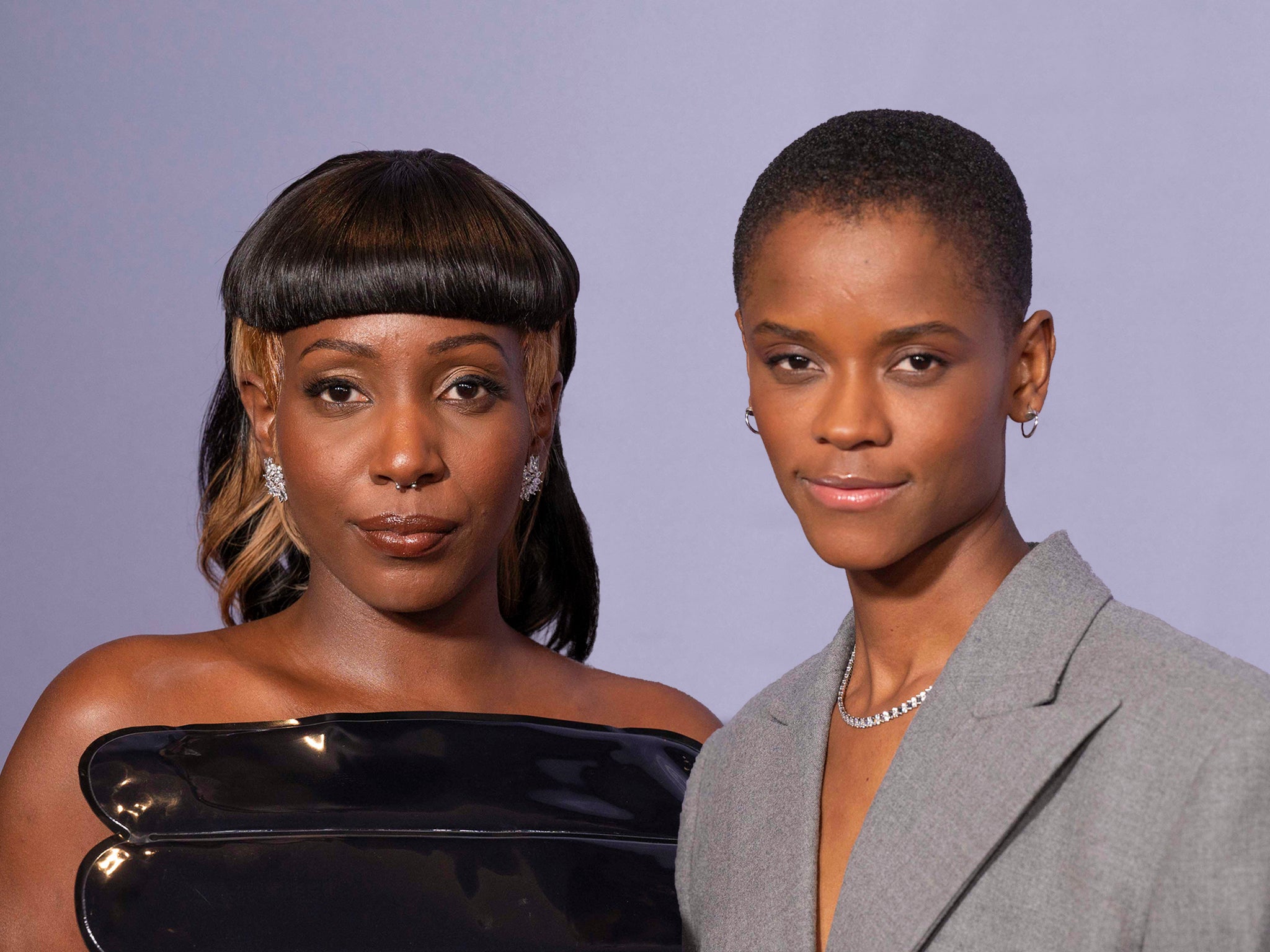The Silent Twins stars Letitia Wright and Tamara Lawrance: ‘I was on the floor, unable to pick myself up’
Twin sisters June and Jennifer Gibbons made headlines for their refusal to speak to anyone but each other. Now the actors playing them in a new film speak to Nicole Vassell about the most gruelling parts of recreating their story


Your support helps us to tell the story
From reproductive rights to climate change to Big Tech, The Independent is on the ground when the story is developing. Whether it's investigating the financials of Elon Musk's pro-Trump PAC or producing our latest documentary, 'The A Word', which shines a light on the American women fighting for reproductive rights, we know how important it is to parse out the facts from the messaging.
At such a critical moment in US history, we need reporters on the ground. Your donation allows us to keep sending journalists to speak to both sides of the story.
The Independent is trusted by Americans across the entire political spectrum. And unlike many other quality news outlets, we choose not to lock Americans out of our reporting and analysis with paywalls. We believe quality journalism should be available to everyone, paid for by those who can afford it.
Your support makes all the difference.In 2020, Letitia Wright and Tamara Lawrance had a challenge on their hands. They’d been cast in The Silent Twins, the film adaptation of the story of June and Jennifer Gibbons, identical twins who made headlines in the Seventies for rarely communicating with anyone but each other. The daughters of Bajan immigrants who’d moved to Pembrokeshire in Wales in 1974, they dressed similarly, moved in unison and had secret laws with one another. Sometimes they’d take it in turns to eat, with only one permitted to have meals on certain days.
Their bond was tight and confounding – and Wright and Lawrance, two unrelated actors, had to become close enough to do it justice on screen. Thankfully, poring over archival footage and documents for a year ahead of filming – as well as a rigorous rehearsal period – made it possible. The actors’ lack of physical similarity is irrelevant; when watching them work together, you can feel an unbreakable link.
“The more we’d be in scenes together, the more we found a routine of things we liked to do,” Wright says today of her and Lawrance’s connection. “Taking walks in the mountainside. Finding therapeutic ways to debrief after hectic work days together – like writing, poetry, putting visuals up on the wall. Trying to do a lot of self-care as well, so that we could be in sync for these characters. We had to allow space for vulnerability, because when you’re playing such interesting characters, naturally that would cause you to find a close mesh and bond.”
Sitting in a London hotel room, long removed from their roles as twin sisters, the actors are both dressed in suits; Wright in black, Lawrance in a dusky pink. Ironically, they’re even in sync now, mood-wise. A long day of press, plus Wright’s jetlag – “I’m in Peru right now, in my head,” she jokes – means that their energies are similarly subdued. Since they filmed, they’ve been involved in more bombastic projects. Just last month, Wright took centre-stage in Black Panther: Wakanda Forever, while Lawrance has starred in the Apple TV Plus series Invasion.
Yet this tender exploration of two misunderstood Black girls, and later Black women, is a project that they hold close, and speak about with pride. Though they’re not feeling their best, that they’re still going ahead with interviews feels like proof of their passion for the story. Wright and Lawrence even have production credits on the film. “We definitely wanted to do the story justice,” Lawrance says. The twin she plays in the film, Jennifer, died of a sudden inflammation of the heart at 29 in 1993, while June – played by Wright – now lives quietly in Wales. “We had to make sure … we weren’t doing a parody of their story, or trying to put our own spin on things – just being authentic to the highs and lows of their journey.”
A key contributing factor to June and Jennifer’s retreat into their own world was their treatment once they arrived in the UK. Due to their parents’ jobs in the Royal Air Force, the Gibbons sisters were born in Yemen, where they were stationed at the time, before moving to Wales. They spoke English with a Bajan accent, and it made them easy marks at school.
Wright, who was born in Guyana, can relate. “I came to England when I was a little kid, so I had an accent,” she explains. “Immediately it was pointed out to me, that it was different and ‘didn’t sound right’. I proceeded to try and change it in the mirror, to try and sound like my friends at school. That was the first time in my life where I felt like I was somewhere that didn’t feel like home.” She pulled on those memories to play June. “I understood the ways in which they’d feel different.”
For Lawrance, that feeling of otherness is also sadly familiar. “[I’m] somebody who is racialised Black and gendered as a woman,” she says. “I think that the world has given those factors quite bad connotations – usually quite weak, inferior, incapable. So to commit to being yourself amidst all the things that are being put onto you is definitely something I can identify with.”

Some of the most difficult scenes to watch in the film take place after June and Jennifer are given an indefinite sentence at Broadmoor psychiatric hospital, after a series of crimes such as arson, vandalism and petty theft, committed in 1981. Though the way they interacted with the outside world was limited, the sisters were avid creative writers. After leaving school at 16, they sought out dramatic life experiences – romantic, thrilling, dangerous – to give depth to their short stories. As shown in the film, this quest led to the abuse of alcohol and drugs, and their brushes with crime.

Watch Apple TV+ free for 7 days
New subscribers only. £8.99/mo. after free trial. Plan auto-renews until cancelled

Watch Apple TV+ free for 7 days
New subscribers only. £8.99/mo. after free trial. Plan auto-renews until cancelled
They were sentenced at 19 and remained in the institution for 11 years, among murderers sometimes three times their age. It was an undoubtedly harsh punishment, and Wright remembers the process of portraying the sisters’ experiences there to be gruelling. “Tough,” she whispers. “Really, really tough. Spiritually, physically, emotionally, really draining. Just to know that they experienced that for 11 years is really triggering.”
Wright found the thought of their detainment hard to shake. “It definitely lingered,” she says. “I was on the floor after a hard day’s work, going through the scenes in my head and being unable to pick myself up. [But] I had to, because we were representing them, and they’d experienced that for 11 years, in and out, up and down. They were asking [the staff], ‘Can we come out? You said if we took our medicine, everything would be okay.’ But they kept saying no – that they needed more time, that they needed to speak more. That messed with my head a bit.”
As taxing as the experience was, neither Wright nor Lawrance have closed the book on wanting to represent real people on film in the future. For Lawrance, in particular, she’s eager to retell more history.
“We need to re-platform the stories of anyone powerful that’s lived and been influential, and changed the world, and been effective, and pierced the consciousness in any way,” she says, urgently. “To have a story that means for two hours you put your phone away, watch it, and learn something? That’s important.”
‘The Silent Twins’ is in UK cinemas now



Join our commenting forum
Join thought-provoking conversations, follow other Independent readers and see their replies
Comments